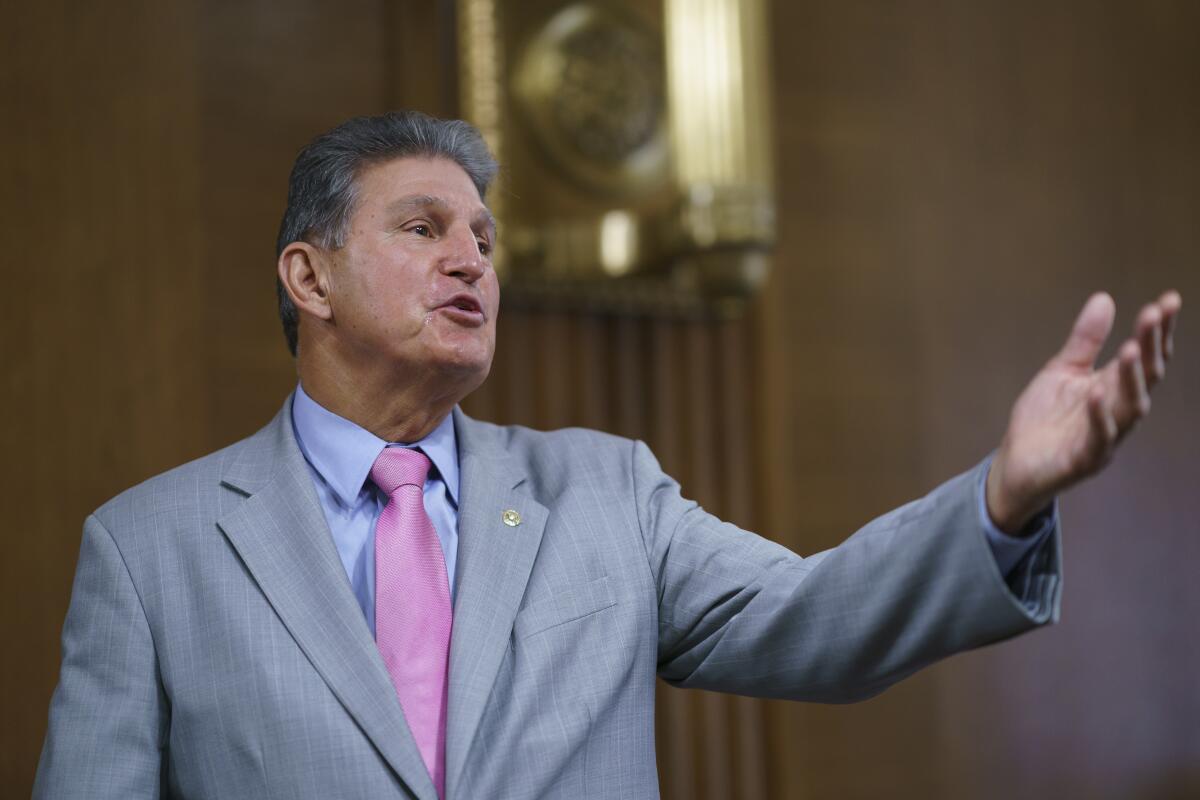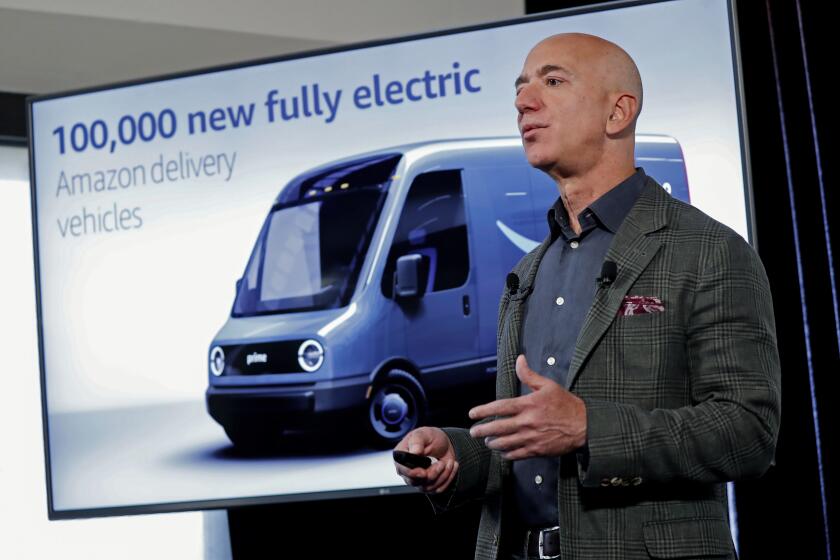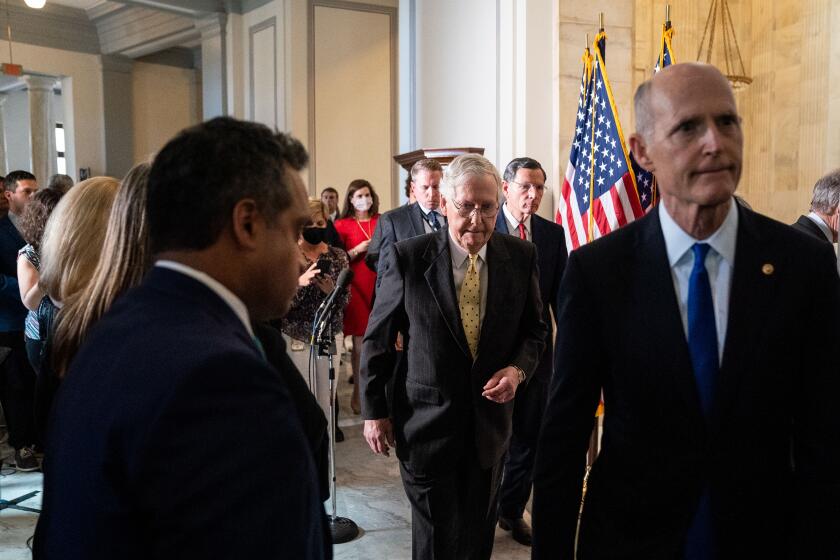Today’s deficit fears are baloney, as they always have been

- Share via
Sen. Joe Manchin (D-W.Va.) is out again Friday with another screed in the Wall Street Journal against deficit spending, this time framed as an attack on the $3.5-trillion spending bill favored by his Democratic colleagues in Congress.
As is invariably the case with the work of deficit hawks, Manchin’s concerns are entirely specious.
“An overheating economy has imposed a costly ‘inflation tax’ on every middle- and working-class American,” he writes.
What do you do if you have a philosophy that over the course of half a century, is continually proven wrong?
— Economic commentator Barry Ritholtz
Never mind that there are absolutely no signs in the real world of an overheating economy, and that since the turn of this century, the annual U.S. inflation rate as tracked by the consumer price index has averaged less than 2.1%, pretty much the Federal Reserve’s target rate. In 2020, the inflation rate was 1.23%.
What Manchin is promoting is an ideological claim about the federal deficit. Thankfully, the estimable Wall Street investment manager and financial commentator Barry Ritholtz is out Friday with a concise, comprehensive debunking of deficit hawkdom (introduced with a blunt but unprintable term).
Get the latest from Michael Hiltzik
Commentary on economics and more from a Pulitzer Prize winner.
You may occasionally receive promotional content from the Los Angeles Times.
Ritholtz asks: “What do you do if you have a philosophy that over the course of half a century, is continually proven wrong?”
He observes, “I have heard the same things over my entire adult life from people who are opposed to government deficits: they repeat the same arguments, again and again, warning us — despite none of the dire things they are warning us about ever come true.”
Here are the oft-repeated claims, as Ritholtz lists them:
“Excess Federal spending will crowd out Private Capital, choking innovation and new company formation; the costs of US borrowing will skyrocket, making the debt impossible to manage; the US Dollar will be devastated, and it will be radically devalued against all other currencies; all of this will cause rampant inflation, spiking prices to levels not seen before; [and] deficits will act as a drag on the overall economy.”
Unmasking the most influential billionaire in U.S. politics
The bottom line: “It has been 50 years of hearing this — and NONE OF IT HAS PROVEN TRUE.” (His emphasis.)
Despite this baleful record, deficit hawks retain an honored place among financial pundits. Prominent among them are the baloney slicers at the Committee for a Responsible Federal Budget, a Washington think tank that long carried water for the late billionaire deficit hawk Peter G. Peterson, who advocated controlling federal outlays by, among other things, cutting Social Security benefits.
In its latest published financial report, covering tax year 2019-20, the Peter G. Peterson Foundation identified the committee as its second-largest grant recipient, at $1.765 million.
The committee, and Manchin, and indeed many others in the anti-deficit camp try to scare the public through subterfuge. They boldface the raw numbers in spending proposals. In the instant case, they keep referring to the Biden administration’s spending bill as $3.5 trillion. Sounds like a lot!
What they gloss over is, first, that the figure covers 10 years of spending and, second, seen in that context, it’s a tiny share of the federal budget. Specifically, the $350-billion average annual spending in the measure amounts to a bare 3.3% of the overall federal budget, which the Biden administration pegs this year at $7.25 trillion.
The hawks further treat these outlays only as expenditures rather than what they really are — investments.
Kevin Drum gives us a thumbnail list of programs to be financed by the spending bill, including turning the increased Obamacare subsidies from the last COVID relief bill permanent; providing universal pre-school for 3- and 4-year-olds and two years of free community college; making the increased child tax credit permanent; adding dental, hearing and vision benefits to Medicare; and funding initiatives against global warming.
To be blunt, if you’re a public official and you can’t see the long-term benefits of making health coverage more affordable for families, improving education for children and access to higher education for low-income students, giving families more resources and fighting global warming, then you should just admit that you don’t belong in public service and find a job elsewhere, like doing PR for the Koch network.
Amazon’s Bezos endorses Biden’s infrastructure plan — but he won’t be paying the cost.
Manchin tries to sugarcoat his opposition to a bill that funds all those programs by asserting that he merely wants to keep America’s powder dry for the next crises. “
“What do we do if the pandemic gets worse under the next viral mutation?” he asks. “What do we do if there is a financial crisis like the one that led to the Great Recession? What if we face a terrorist attack or major international conflict? How will America respond to such crises if we needlessly spend trillions of dollars today?”
The word “needlessly” in that paragraph carries more weight than it can handle. But Manchin forgoes mentioning that deficit hawks opposed most of the pandemic spending bills and succeeded in limiting the government fiscal response to the last financial crisis to the point that it hamstrung America’s recovery for the better part of a decade. In other words, what else is new?
Deficit hawks have sounded their alarm in various forms over the last decade or so. In 2010, for instance, Harvard economists Kenneth Rogoff and Carmen Reinhart proposed a break point when government debt reached 90% of gross domestic product, a level the U.S. had supposedly reached that year.
Countries that exceeded that ratio, the economists asserted, had lower economic growth rates than those with lower ratios. It turned out that the economists had made several statistical errors that invalidated their thesis, which made little logical sense anyway — GDP figures are snapshots in time, and debt is paid off over years or decades, so one thing has nothing really to do with the other.
Hiltzik: McConnell complains about national debt, but blames it on assistance for ordinary Americans
Republicans, fretting again over the national debt, skate over the role of their tax cuts for the wealthy.
Anyway, no one hears much about the 90% ratio anymore, for good reason. But as Ritholtz observes, that claim and others beloved of the anti-deficit crowd have bequeathed us not only the meager recovery from the Great Recession, but more economic inequality, and the squandering of an opportunity to refinance America’s debt and invest for the future by taking advantage of historically low interest rates.
By contrast, the recovery from the pandemic shock has been robust, largely because Congress set deficit fears aside and protected household incomes.
“We can fix our infrastructure, extend broadband to everyone throughout the country, even work to moderate climate change,” Ritholtz writes, “and the economy will be just fine.” Not just fine, he might have added, but better and healthier.
More to Read
Get the latest from Michael Hiltzik
Commentary on economics and more from a Pulitzer Prize winner.
You may occasionally receive promotional content from the Los Angeles Times.












